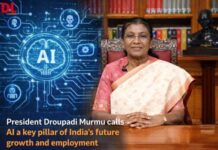 Despite real improvements in access to, and use of, information and communication technology around the world, there is a wealth of evidence to suggest that the digital divide between and within countries is growing. In response to the significant challenge microsoft had launched its global initiatives called the Partners-in- Learning Programme. Vincent Quah, Regional Academic Programs Manager, Asia Pacific Public Sector, Microsoft, gives an Asia pacific overview of this programme and Microsoft’s visions in a conversation with Rumi Mallick of Digital Learning.
Despite real improvements in access to, and use of, information and communication technology around the world, there is a wealth of evidence to suggest that the digital divide between and within countries is growing. In response to the significant challenge microsoft had launched its global initiatives called the Partners-in- Learning Programme. Vincent Quah, Regional Academic Programs Manager, Asia Pacific Public Sector, Microsoft, gives an Asia pacific overview of this programme and Microsoft’s visions in a conversation with Rumi Mallick of Digital Learning.
? Can Public-Private Partnership as a framework address the challenges in education in Asia?
If you look at a lot of government and the kind of investment they are putting into education it can be pre-daunting and can be unsustainable. For example, in a populous country like India, how do you try to address the education
divide in India, will the country be able to put the necessary investment to support and ensure that many children can access quality education and technology? Therefore, the whole notion of Public Private Partnership as a possible framework for sustainable manpower development, is now even of more important consideration than before. And so Microsoft is one such example of Public Private Partnership to work with government to understand the major, more important priorities of countries so as to help them to begin addressing the challenges in education.
? What are the other challenges to education in the Asia Pacific?
The same challenges faced by Asia pacific is also faced by Europe, faced by Africa, in Latin America, in US. The challenge is that people have not problem has to be addressed from the core. Not only the teachers, the school leaders and the policy makers as well need to be digitally literate. You have to ensure maximum results out of implementation.
? When you refer to ICT enabled education, what kind of innovation will you highlight?
We need to start changing our terminology here, putting emphasis on ICT-enabled education, not ICT integrated. It is an assumption that it is the foundation. May be we should not think about the kid. ICT one day will become like a calculator, like a pen and paper, where we should really focus in the innovation, and the change in the pedagogy and curriculum, the change in the
assessment system, the change of learning and relearning and applying lessons learned into the system.
? What are your future visions for the rural area?
The future is like envisioning what the school can be like. That picture, that vision could be different for different schools and different regions. The future of a rural school can be, how am I going to be relevant to the rural been able to benefit from the impact and the investment the government is making in technology. We keep learning the good practices, great examples how teachers and students really blossom as a result of technology, though we have not seen the widespread, cyspanic, embracing use of technology and how technology has impacted, that is one challenge. The other challenge is having something at
the country level that will enable to become comparative work force, enable them to have digital literacy and helping them with an improved quality of life.
? Why Microsoft has been focusing on teachers’ in most of the programmes?
Teachers are very keen in the education sector. With technology, teachers are no longer going to be relevant, but on the contrary teachers are becoming more important, have very different role, of an expert, a manager and a facilitator. Teachers are the key for students. So it will be a much easier approach to make the students learn and understand if the teachers are properly trained. Students are digitally literate where as the teachers are digitally illiterate. The children to ensure that they can have a good career in future and so they can design the school around that vision. Important is what is a great, mighty or important thing in one country need not necessarily be
applicable in your own context.
? What is your experience so far in working with the Asian countries?
I think the governments in Asia Pacific are in a real high demand stage. It is not actually a question of over-supply; it is a question of overdemand. So much that has to be done at the country level; they embrace different programmes including Microsoft into part and parcel of their overall national strategy. And our experience working with governments is very very positive. The partnership learning initiative has been the most successful programme of Microsoft. We never had so many partnerships; as of today we have 101 countries on this programme.
? You might have faced some challenges working with Asian governments. Can you relate a few?
Working with Government is all about establishing trust during relationship. When we started in some countries, government was little concerned and skeptical as organisations like Microsoft want to make partnership with them. But I think when they see that we meant what we say, we meet the commitments, we do the things we are going to say, that is where the change, the trust begins to grow, that is when they become more prepared to have more in-depth discussion about some of the things that are working and some of the things that are not working in the country.
? What is the Microsoft vision of education worldwide?
Microsoft vision of education worldwide, not just for Asia is that we believe technology can play very important role in the whole business of education, in the teaching and learning area as well as meeting the lifestyle of the students and teachers. We believe the technology can help them fulfill their potentials, that is Microsoft’s ultimate vision.
? What do you think has been your major achivement?
If I can see a sparkle in the eyes of the students, in the eyes of the teachers, in the eyes of policy makers with whom we work. At the end of the day it should be about creating better opportunities for them, it’s about impacting positively.
? Any specific achievement in last few years?
Wherever I travel I always meet up schools and teachers, educators, senior level officers, ministers. We run a conference for senior government people in the ministry so that we can understand their problems, at the same time we help them realise that this is how the world is moving, technological advances are happening, they need to be aware of some of these things as well. So we
make the relationship and make it grow and I think this is one big area that I can count as my achievement in helping develop this trust and this relationship between government and Microsoft.
? How do you see Asia in ten years from now?
Asia will experience very explosive growth. Hopefully in ten years time we will be looking to new challenges rather than focusing on old challenges which we would have overcome by then. The people who are involved in the education
sector would be much more savvy with what the current fence of the world. The students we are teaching are going to experience very different lifestyles after 20 years from now.
























